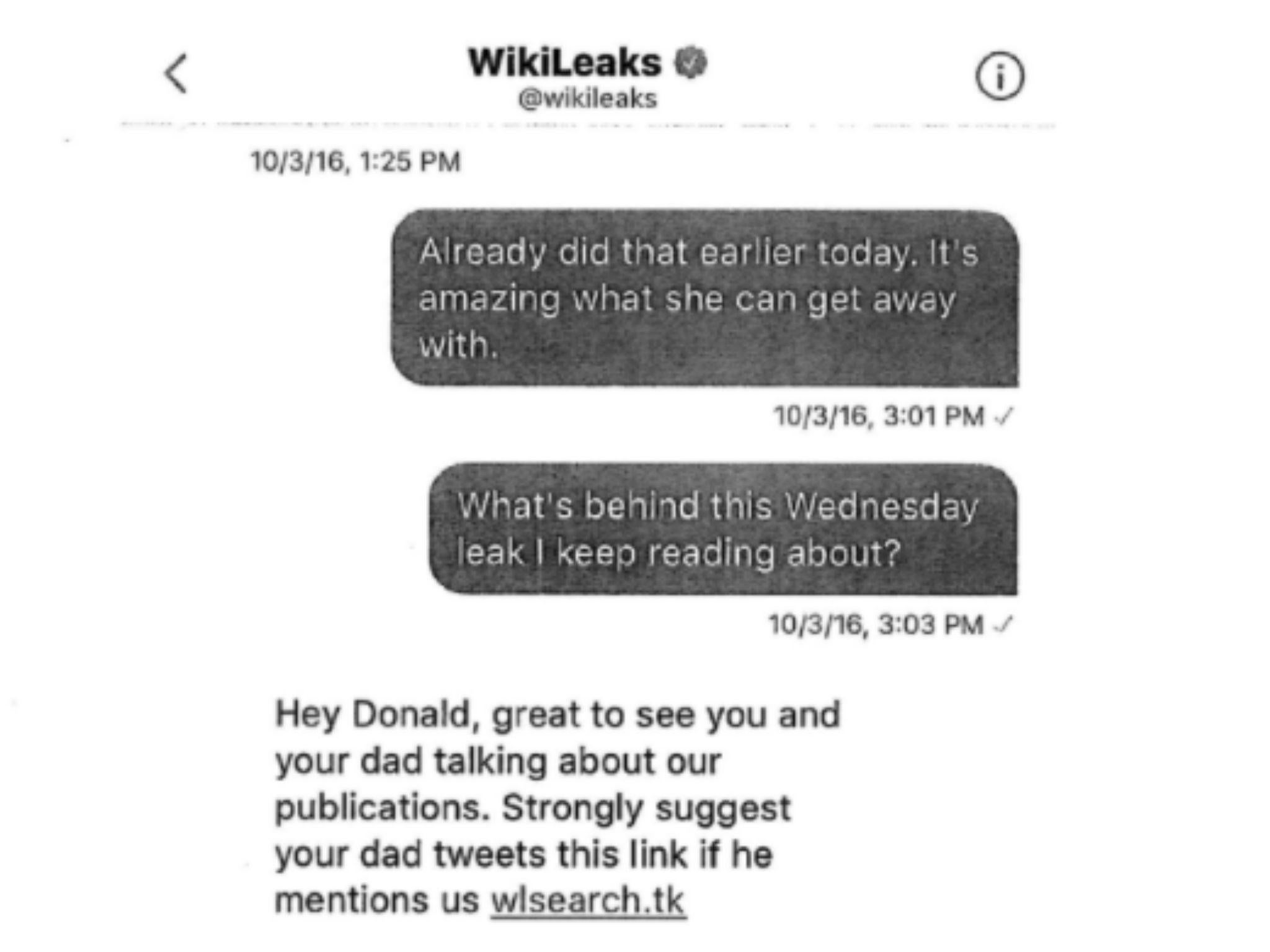Donald Trump Jr releases private messages between him and Wikileaks
President's son discloses communications with WikiLeaks

Your support helps us to tell the story
From reproductive rights to climate change to Big Tech, The Independent is on the ground when the story is developing. Whether it's investigating the financials of Elon Musk's pro-Trump PAC or producing our latest documentary, 'The A Word', which shines a light on the American women fighting for reproductive rights, we know how important it is to parse out the facts from the messaging.
At such a critical moment in US history, we need reporters on the ground. Your donation allows us to keep sending journalists to speak to both sides of the story.
The Independent is trusted by Americans across the entire political spectrum. And unlike many other quality news outlets, we choose not to lock Americans out of our reporting and analysis with paywalls. We believe quality journalism should be available to everyone, paid for by those who can afford it.
Your support makes all the difference.Donald Trump Jr has released his private messages with Wikileaks, after an explosive report revealed he was in communication with Julian Assange's organisation during his father's 2016 election campaign.
Earlier in the day, The Atlantic revealed that Donald Trump, Jr had exchanged direct messages on Twitter with WikiLeaks both during the presidential campaign and since his father Donald Trump became President. The Atlantic reported that the communications were shared with Congressional investigators who are looking for evidence that the Trump campaign collaborated with the Russian government.
WikiLeaks generated controversy during the 2016 presidential campaigns with periodic releases of emails from Democratic National Committee officials and Hillary Clinton campaign chairman John Podesta. American intelligence officials believe Russian operatives pilfered the emails at the direction of their government as part of an effort to upend the campaign and aid Donald Trump.
Donald Trump Jr downplayed the communication, prefacing a series of Twitter messages with images of his conversation by noting his “whopping three responses”.
Among those responses: when WikiLeaks contacted him in September of 2016 about an “anti-Trump” website affiliated with a political action committee, Donald Trump Jr replied “Off the record I don't know who that is but I'll ask around. Thanks”. According to The Atlantic, Donald Trump Jr queried multiple campaign officials about the matter.
In another message, Mr Trump writes “amazing what she can get away with”, in reference to Democratic nominee Hillary Clinton, and sought information from WikiLeaks: “What's with that Wednesday leak I keep reading about”? he asked in a message sent a little over a month before Election Day.
Weeks before the election, another message shows, WikiLeaks contacted Donald Trump Jr to encourage his father to not concede if he lost the election. In the weeks leading up to Election Day Donald Trump repeatedly refused to say he would accept the election results if Ms Clinton was deemed the winner, raising the seemingly unthinkable prospect of America failing to ensure an orderly transfer of power.
In response to the article in The Atlantic, WikiLeaks founder Julian Assange said on Twitter that “WikiLeaks can be very effective at convincing even high profile people that it is their interest to promote links to its publications” and referenced a July tweet in which he referenced contacting Donald Trump, Jr.
Donald Trump Jr's decision to publish the messages was reminiscent when earlier this year, he sought to get in front of news coverage about a previously undisclosed meeting with a Russian operative promising damaging information on Ms Clinton by publishing his emails concerning the meeting.
Promised “some official documents and information that would incriminate Hillary [Clinton]” as part of “Russia and its government’s support for Mr Trump”, Donald Trump Jr replied “if it’s what you say I love it”.
In releasing those emails, Donald Trump Jr characterised the exchange as an example of the type of opposition research common to political campaigns. Both he and the President have repeatedly and vociferously denied any collusion with Russia.
Join our commenting forum
Join thought-provoking conversations, follow other Independent readers and see their replies
Comments